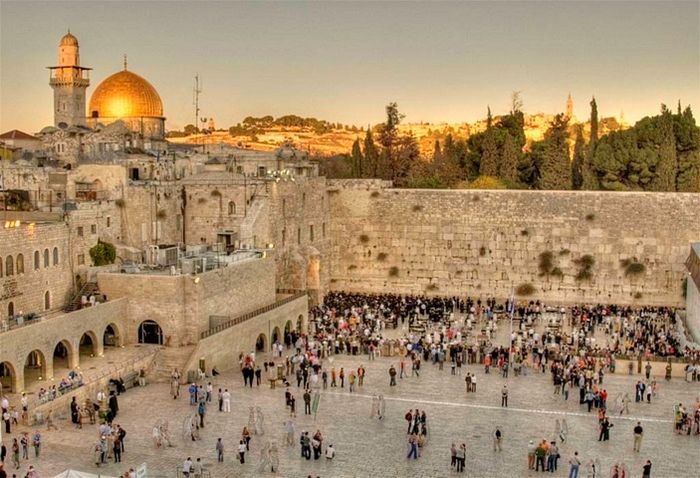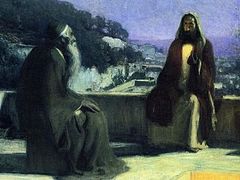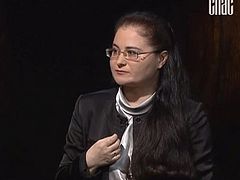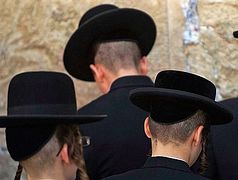In my last blog post I looked at the patristic project of commending the Christian Faith to one’s Jewish neighbour, and concluded that the project, though fraught with potential for misunderstanding, was still worthwhile. Here I would like to suggest that the religion of Israel was clearly preparatory, and was never meant to be God’s final word to Israel or to mankind.
In discussing Israel’s religion it is important to differentiate the religion as practised from the time of Moses to the first century from the Jewish religion after the catastrophe of 70 A.D. The Mosaic religion was very different from post-70 A.D. Rabbinic Judaism, in that Mosaic religion centered upon sacrifice, and after 70 A.D. Jewish sacrifices were no longer possible.
This difference is difficult to exaggerate. The religion described in the Hebrew Bible took it for granted that God’s presence, forgiveness, and blessing were accessed through the offering of sacrifice, at first on the altar which was part of the portable shrine carried by the Levites, and then at the immovable Temple built in Jerusalem. That Temple and altar were destroyed in 586 B.C. by the Babylonians, and rebuilt after the exile, and then later still enlarged by Herod the Great. Its presence was considered as absolutely necessary to the religious life of the nation. The pain experienced at its loss and the urgent necessity of its restoration were both expressed in the prayer offered by Azariah when he and two of his exilic companions were thrown into the fiery furnace by Nebuchadnezzar in Babylon: “At this time there is no prince, no prophet or leader, no burnt offering or sacrifice or oblation or incense, no place to make an offering before You or to find mercy” (Daniel 3 LXX). Note this last bit: “no place to find mercy”. The heart of Mosaic religion was sacrifice; the written Law was given to support these sacrifices and, along with the Prophets, to tell the people how the God to whom they sacrificed wanted them to live. Their culture at that time was an oral culture, not a written one as ours is today. The average Israelite did not pore over the pages of a Book; he approached the altar with joy and trembling to find the living God.
After the Temple was destroyed, Judaism had to be refashioned to accommodate this loss. The contrite heart and humble spirit which were once to accompany sacrifice now had to replace it. But there is no suggestion in the Law that sacrifice was really replaceable. It is true that of course God is not so unreasonable as to demand the impossible. It is also true that Rabbinic Judaism, centered on the study of literature, is radically different than the Judaism practiced while the Temple was still standing. In the discussion that follows I will be focussing upon the religion as revealed to Moses at Sinai and contained in the Law, not upon Judaism as presently constituted.
All religions bear traces of the time of their origin—especially religions with Scriptures, such as Judaism, Christianity, and Islam. Thus in the Old and New Testaments (and in the Quran) we find slaves mentioned, since slaves existed when these Scriptures were written. The mere fact that slaves feature in these Scriptures may or may not constitute an endorsement of slavery. Whether or not slavery is actually endorsed depends upon what the Scriptures say about slavery, not the mere fact that slavery is mentioned.
In the same way, the fact that the Law of Moses contains such details from the Bronze Age such as oxen goring people (Exodus 21:28) or that it assumes that most of the population live in an agricultural setting (Deuteronomy 26) is no argument against its timeless universality. The commandment, for example, that you shall not muzzle an ox while it is threshing, but allow it to eat while it works (Deuteronomy 25:4) is capable of many different applications—as St. Paul’s use of it testifies (1 Timothy 5:18). Timeless principles can easily be culturally expressed and enshrined within a particular culture at a particular time, and most of the provisions of the Law are capable of such application in other cultures and times.
But certain things in the Law are not capable of such timeless application, but presuppose a Bronze Age culture and population when all of Israel dwelt within the Promised Land with a certain limited population. Indeed, when Israel expanded beyond the borders of the Land of Israel after the Bronze Age and dwelt far from the Land of Israel, certain commandments of the Law were no longer capable of being fulfilled. This argues for the temporary and time-bound nature of the Mosaic Law, and that it was never intended to be God’s final word to His people, but simply one stage of their continuing journey.
Take for example the commandment that all Israelite males must resort three times a year to the central shrine to offer sacrifice—at the Passover and the feast of the Unleavened Bread, at the feast of harvest (i.e. the Feast of Weeks or Pentecost), and at the feast of the ingathering in the autumn (i.e. the Feast of Booths). This commandment is not like the commandment to not muzzle the threshing ox (which did not apply if you did not own an ox), and obedience to it was mandatory. In Exodus 23:14f, God says, “Three times a year you shall keep a feast to Me…Three times in the year shall all your males appear before the Lord Yahweh”. The commandment to assemble three times a year at the central shrine to offer sacrifice is repeated again in Exodus 34:18f, Leviticus 23:1, and Deuteronomy 16:1f. There is no suggestion that obedience to this command was optional or that it depended upon one’s location or inclination. But after Israel increased in population and expanded beyond its national borders so that large chunks of Jewish population lived in the Diaspora, this commandment became impossible to fulfill. In fact most Diaspora Jews only rarely came to the Temple to sacrifice, because travel to the Holy Land was so difficult. This commandment also assumes that the Israelite population was such that all the males could assemble together and the sacrificing priests would not be overwhelmed by the number of sacrifices—that is, it assumes a population consistent with its Bronze Age existence.
Take another example: the provision of a city of refuge for someone guilty of manslaughter and fleeing from the “avenger of blood” (i.e. a kinsman prosecuting a blood-feud). The Law appointed certain “cities of refuge” to which the guilty party might flee and find safety. He would have to remain within that city until the death of the incumbent high priest; if he was found outside the city, the avenger of blood could justly take his revenge and kill him. The provision for such cities of refuge forms an important part of the national life envisioned by the Mosaic Law—Moses himself established three cities of refuge east of the Jordan before Israel crossed over and began to conquer the land (Deuteronomy 4:41f), and the Mosaic legislation repeatedly refers to other cities of refuge (Exodus 21:12f, Numbers 35:9f, Deuteronomy 19:1f). These cities were arranged to be within easy reach of those requiring them and so they were scattered throughout the Land of Israel. Note: scattered throughout the Land of Israel. The Law presupposes that all Israelites were living within the Land of Israel. Large Jewish expansion beyond Palestine and into the Diaspora made obedience to this part of the Law impossible to fulfill, and these provisions out-of-date.And that is the point. These precepts within the Mosaic Law suggest that the Law was given to Israel for one stage of its ongoing journey throughout history, and not as God’s final word. In fact after the loss of the Temple many if not most of the Law’s provisions could no longer be fulfilled. God allowed the Temple to be destroyed because the sacrifices mandated in the Law were never intended to be offered indefinitely.
If one says that, on the contrary, the Mosaic Law delivered during the Bronze Age at Mount Sinai was indeed God’s final and definitive will for His people, then one must also assert that apart from animal sacrifice God cannot be adequately worshipped. Pretty much all of the ancients believed this, and so the pagans blamed the Christians for repudiating animal sacrifice. The ancient Jews believed this too, as we have seen from the citation from The Book of Daniel and from Jewish anguish over the catastrophe of 70 A.D. Are we really prepared to assert this today? Will we really say that the blood of bulls and goats takes away sins (compare Hebrews 10:4), and that an altar smoking daily with the burnt carcasses of animals represents the zenith of liturgical spirituality? If we are not prepared to turn back the clock like this and make these assertions, then we must admit that the Mosaic Law was not God’s final word to Israel, but rather but a step on the way to something truly final—a necessary step, but a mere step nonetheless. Mosaic Judaism and its Law were never intended as God’s final word to Israel. The Law was but a tutor to bring Israel to a better place.




